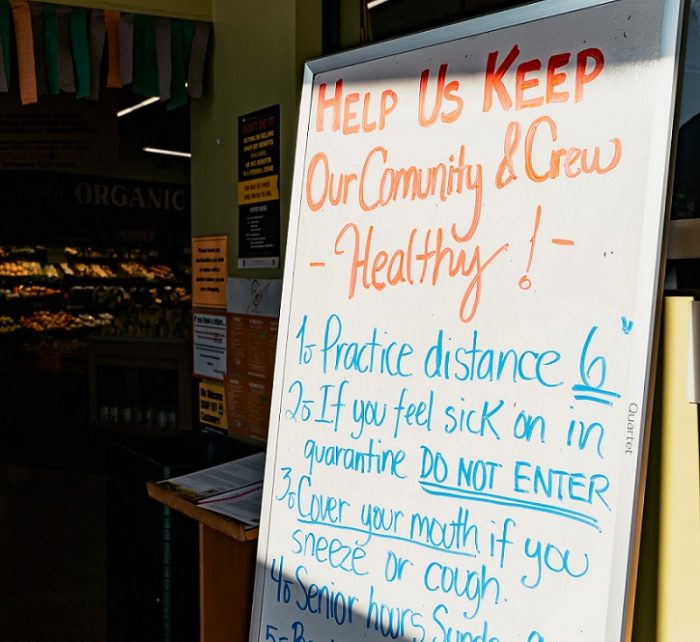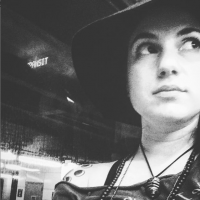Elephant’s Continually-updating Coronavirus Diary. ~ Waylon
~
A majority of my working life has been in retail.
The retail environment comes with a different set of quirks than an office setting, which is well-represented in the NBC show “Superstore.”
I recently binge-watched it on Hulu and couldn’t stop laughing at the relatable content. Workplace sitcoms tend to have cult followings (hello, “The Office” and “Parks and Recreation”). If it’s because viewers empathize with desk life, or simply because they like to quote Dwight Schrute, I don’t know. I just know people love them.
I had a brief stint at a desk job that was slightly similar to the hijinks of Michael Scott and crew. However, there is nothing—and I mean nothing—like what one encounters working in retail.
“Superstore” struck a chord with me because it reminded me how misunderstood retail workers are. While working a standard 9-5, I had coworkers who had never worked outside of desk life. They assumed retail was for the lazy and uneducated. Finding out this stigma prompted me to talk to friends and family members who had also never worked retail. I wanted to know if everyone felt this way.
Most people I spoke to were floored that retail workers usually don’t have holidays off or a set schedule. They also didn’t know store hours do not reflect shift hours. It shocked friends to hear I had to work 5 a.m. shifts to get trucks unloaded before a store opened at 8 a.m., or that I sometimes worked well into the night to get shelves stocked after closing. I don’t know who they assumed was putting the product on the shelves, or when, but it seemed like something they had never considered before.
My wonder at the lack of empathy for retail workers increased after these conversations. I began to observe how friends and family behaved in retail settings. I witnessed them cut employees off while they were in the middle of helping another customer—no “Excuse me,” just a gruff, “Where is the guacamole?!?!”
I saw them completely disregard floor workers who greeted them.
I saw them talk in demeaning tones to waitstaff.
I watched as they left clothes all over dressing room floors, discarded trash on shelves, and blamed long lines on cashiers.
I especially smoldered when they blamed the cashiers. I’ve worked for two popular grocery chains, so I assure anyone reading this: the long lines on a Sunday afternoon are not a cashier’s fault.
This discovery of the misunderstood world of retail workers prompted me to set an example for coworkers, family, and friends. In any type of service setting, I greet employees with a genuine hello and make sure to ask them how their day is going before asking a question. I make a point to put back merchandise where it belongs and to carry out any trash I came in with.
Truthfully, retail is hard. It is physically and emotionally demanding. Retail employees have a stigma of laziness and miseducation tacked onto them that simply is not true. The workers you encounter at your favorite stores are supporting their families. They are entrepreneurs working hard to fund their dream. They are college graduates in a saturated job market who need to pay back student debt. They are people trying to make an honest living and keep a roof over their heads.
After watching “Superstore,” I felt sure I was witnessing a catalyst for change in how retail workers are perceived by society. Turns out there was a much bigger wake-up call coming: COVID-19.
The COVID-19 pandemic came on slowly, then suddenly. It was almost a joke—until it wasn’t. In the first week of March 2020, people were living life as usual, laughing at the prospect of being afraid of a “minor flu.” By St. Patrick’s Day, almost everything in the country was shut down. By April 1st, life as we knew it in the United States was at an almost-complete standstill, except for “essential” businesses. Unemployment skyrocketed as non-essential workers were furloughed.
Guess who is in that “essential worker” category?
Grocery store workers.
I have a place in my heart for grocery workers and always will. It’s a hard job that’s not for the faint of heart. A lot of people who come to the industry seeking a fun, easy way to make money don’t last, especially during hard times.
I know from experience how hard things must be for them right now. I worked for a certain popular organic grocery store during the weeks following Superstorm Sandy.
Sandy devastated much of the area I lived in, altering life for months after the storm was over. The store I worked in was one of the first to reopen, and luckily it was decently stocked with groceries (due to damage on the roads, delivery trucks from many suppliers could not get to most stores in the area). Aside from keeping the shelves full, the employees also set up a charging station to help out the community. Most of the population was without power for weeks and had no way to charge phones or laptops.
It was heaven for many customers. But it was hell for the employees.
The store ran on a time-constricted generator, and because the lights—and registers—turned off at a certain hour, we were racing the clock every day to help our customers. Employees and shoppers had to be out of the building before the strict curfew that had been put in place. At that time, the roads were hazardous after dark. Traffic lights and street lights were out, and power lines, telephone poles, and trees were down everywhere. This made driving difficult and in some places, impossible. The curfew was for everyone’s safety and mandated by the state of New Jersey—but this didn’t stop shoppers from having angry confrontations with the employees because they didn’t want the store to close early.
You would think the collective trauma that the community had just gone through would have brought us together, but no. To this day I have never seen people be so cruel. I was cussed out over the phone because our store did not have the organic, grass-fed, whole milk Greek yogurt someone wanted. Shoppers screamed at each other for trying to cut lines and physically fought over bags of ice. Workers endured verbal abuse daily, as if it were our fault that things were so tense at that time. People even tried to pry the front doors open after we closed, as a rebellion against the restricted store hours. The most upsetting thing I witnessed was a man cursing at a pregnant mother and her toddler.
I certainly hope grocery employees in the time of COVID-19 fare better.
There are posts circulating on Facebook and Instagram thanking “essential workers” during this pandemic, some for grocery and food service workers specifically. Stories have run on my local news about how discarded PPE left in shopping carts or strewn across parking lots are a disgraceful offense against the grocery store workers who have to pick them up. The media is not only recognizing grocery workers, they are defending them. It gives me hope for humanity.
I have been grocery shopping a handful of times since social distancing began. I still have friends—and a husband—who work in the industry. I have heard and witnessed mixed accounts of kindness and cruelty. I pray that in these strange times we are living in, kindness conquers.
COVID-19 has given us a world we have never experienced. In a time when major league sports, Broadway, and Disney World have been silenced, people have reverted to simple acts such as handwritten signs and baking bread. We find joy through celebrating a new kind of hero: essential workers. What I think is the most stunning is how essential workers have realized they need each other.
If truck drivers were unable to transport our food from source to store, all food-industry workers would be without a job. If grocery workers were unable to get that food from truck to shelf, we wouldn’t have the privilege of going to a store where we can pick and choose food to feed our families. If grocery stores and food service businesses weren’t up and running, what would we eat? How would doctors and nurses get the sustenance they need to work long shifts on the COVID-19 floor? And without our doctors and nurses, who would care for the many, many grocery store employees who are contracting the virus due to constant exposure to the public?
In the absence of all of our pop culture distractions, a silver lining can be seen in the Coronavirus pandemic: society is finally recognizing true heroes. Baseball stars, actors, musicians—these are people we can look up to, but they are not heroes. A hero is a father of two young daughters, working double shifts at a grocery store so he can pitch in with sanitation efforts before and after shopping hours. Heroes are the employees who are unloading tons of pallets at lightning speed to get fresh food on the shelves. Heroes are gathering carts on a rainy, windy day, and picking people’s dirty, discarded PPE out of them.
I’m curious to see how, in the coming months, this moment in history will be portrayed on popular television and in movies. I hope shows like “Superstore” represent this time for employees both on and off the job in a raw, real way. I hope more stories spawn from this crisis, so more voices of the retail world can be heard on TV, in movies, and in books. I want to believe that the pandemic will genuinely change society’s view of essential workers. However, for that change to happen, the voices of retail workers must continue to be heard.
Even though I’ve left the retail world, my heart is still a part of it. Please don’t forget about us, because when the rubble of Coronavirus is cleared away, we retail workers—past, present, and future—will still be heroes.
~









Read 3 comments and reply